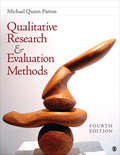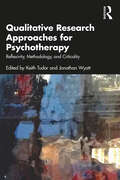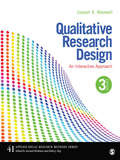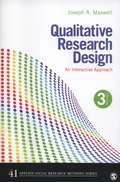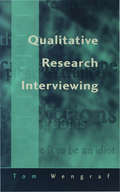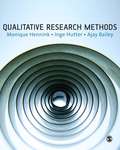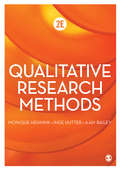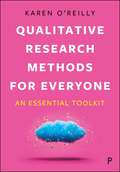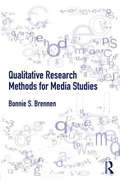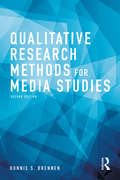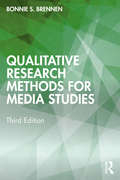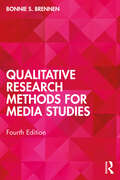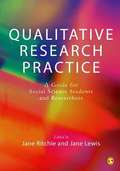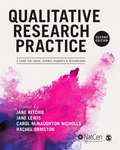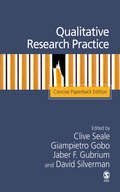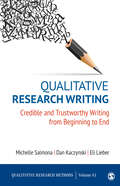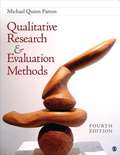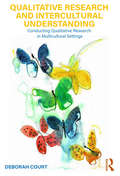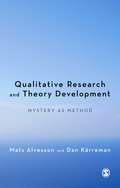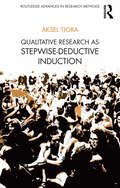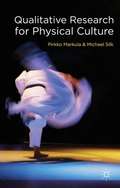- Table View
- List View
Qualitative Research & Evaluation Methods: Integrating Theory and Practice
by Michael Quinn PattonDrawing on more than 40 years of experience conducting applied social science research and program evaluation, author Michael Quinn Patton has crafted the most comprehensive and systematic book on qualitative research and evaluation methods, inquiry frameworks, and analysis options available today. Now offering more balance between applied research and evaluation, this Fourth Edition illuminates all aspects of qualitative inquiry through new examples, stories, and cartoons; more than a hundred new summarizing and synthesizing exhibits; and a wide range of new highlight sections/sidebars that elaborate on important and emergent issues. For the first time, full case studies are included to illustrate extended research and evaluation examples. In addition, each chapter features an extended "rumination," written in a voice and style more emphatic and engaging than traditional textbook style, about a core issue of persistent debate and controversy.
Qualitative Research Approaches for Psychotherapy: Reflexivity, Methodology, and Criticality
by Keith Tudor Jonathan WyattQualitative Research Approaches for Psychotherapy offers the reader a range of current qualitative research approaches congruent with the values and practices of psychotherapy itself: experience-based, reflective, contextualized, and critical. This volume contains 14 compelling, challenging new essays from authors in both the Northern and Southern hemispheres, writing from a range of theoretical and cultural perspectives. The book covers both established and emerging approaches to qualitative research in this field, beginning with case study, ending with postqualitative, and with hermeneutic, reflexive, psychosocial, Talanoa, queer, feminist, critical race theory, heuristic, grounded theory, authoethnographic, poetic and collaborative writing approaches in between. These chapters introduce and explore the complexity of the specific research approach, its assumptions, challenges, ethics, and potentials, including examples from the authors’ own research, therapeutic practice, and life. The book is not a ‘how to’ guide to methods but, rather, a stimulus for psychotherapy researchers to think and feel their way differently into their research endeavours. This book will be an invaluable resource to postgraduate students, practitioners and established researchers in psychotherapy who are undertaking (or considering) qualitative research for their projects. It will also appeal to course tutors and trainers looking for a volume around which to structure a qualitative research methods course.
Qualitative Research Design: An Interactive Approach
by Joseph A. MaxwellQualitative Research Design: An Interactive Approach, Third Edition provides researchers and students with a user-friendly, step-by-step guide to planning qualitative research. Joseph A. Maxwell shows how the components of design interact with each other, and provides a strategy for creating coherent and workable relationships among these design components, highlighting key design issues. Written in an informal, jargon-free style, the book incorporates examples and hands-on exercises."This book uses everyday language that will captivate students' attention and embed practical knowledge to supplement the technical." —Gaetane Jean-Marie, University of Oklahoma"The key strengths of the text are the passion and the enthusiasm that Dr. Maxwell has for qualitative research after all these years. I feel I can also utilize these concepts on my own research team and take them out of the classroom and into research team meetings with colleagues." —Deborah Gioia, University of Maryland, Baltimore"I really liked this book. I found myself taking notes and saying "yes" so many times because Maxwell captures the research process so well and provides many points worth quoting. As a faculty mentor, I particularly see the value of this book for my students who are conducting qualitative dissertations." —Mary S. Enright, Capella University"The text is incredibly engaging and practical...So many of the issues raised in the book are central to qualitative research, yet often not explicitly discussed in 'public' venues." - David Carlone, The University of North Carolina at Greensboro"I particularly like the interactive focus and believe that helps students to more realistically engage qualitative research design. It certainly lives up to its billing as a good guidebook, and I appreciate the fact that the author really concentrates on useful content, exercises, insights, and examples, and leaves extensive theory discussions to others." - Sharon L. Caudle, Texas A & M University
Qualitative Research Design: An Interactive Approach (Third Edition)
by Joseph A. MaxwellQualitative Research Design: An Interactive Approach, Third Edition provides researchers and students with a user-friendly, step-by-step guide to planning qualitative research. Joseph A. Maxwell shows how the components of design interact with each other, and provides a strategy for creating coherent and workable relationships among these design components, highlighting key design issues. Written in an informal, jargon-free style, the book incorporates examples and hands-on exercises. "This book uses everyday language that will captivate students' attention and embed practical knowledge to supplement the technical. " --Gaetane Jean-Marie, University of Oklahoma "The key strengths of the text are the passion and the enthusiasm that Dr. Maxwell has for qualitative research after all these years. I feel I can also utilize these concepts on my own research team and take them out of the classroom and into research team meetings with colleagues. " --Deborah Gioia, University of Maryland, Baltimore "I really liked this book. I found myself taking notes and saying "yes" so many times because Maxwell captures the research process so well and provides many points worth quoting. As a faculty mentor, I particularly see the value of this book for my students who are conducting qualitative dissertations. " --Mary S. Enright, Capella University "The text is incredibly engaging and practical. . . So many of the issues raised in the book are central to qualitative research, yet often not explicitly discussed in 'public' venues. " - David Carlone, The University of North Carolina at Greensboro "I particularly like the interactive focus and believe that helps students to more realistically engage qualitative research design. It certainly lives up to its billing as a good guidebook, and I appreciate the fact that the author really concentrates on useful content, exercises, insights, and examples, and leaves extensive theory discussions to others. " - Sharon L. Caudle, Texas A & M University
Qualitative Research Interviewing: Biographic Narrative and Semi-Structured Methods
by Dr Tom Wengraf`Wengraf provides a comprehensive theoretical and practical guide to the planning, conduct, and interpretative analysis of data by semi-structured interviewing methods. Forthright and frank in his comments about the limitations and practical implications of varying choices which investigators have to make in designing their research projects. Reading this text is like having a tough but expert and caring mentor who wants you to do the best research possible, but will not hesitate to tell you when your ideology and assumptions skew that possibility' - Vincent W Hevern, Le Moyne College, USA Unique in its conceptual coherence and the level of practical detail, this book provides a comprehensive resource for those concerned with the practice of semi-structured interviewing, the most commonly used interview approach in social research, and in particular for in-depth, biographic narrative interviewing. It covers the full range of practices from the identification of topics through to strategies for writing up research findings in diverse ways.
Qualitative Research Methods
by Monique Hennink Inge Hutter Ajay BaileyThis comprehensive text takes a practical approach that mirrors the path that students follow in conducting a research project. The book is based on the authors' highly successful multidisciplinary qualitative methods workshops, which have been conducted for over a decade. They introduce a 'qualitative research cycle' that leads students through the selection of appropriate methods, the collection of data, and the transformation of findings into a finished project. The book provides a clear explanation of the nature of qualitative research and its key concepts.
Qualitative Research Methods
by Monique Hennink Inge Hutter Ajay BaileyPractical and straightforward, this book is a multidisciplinary introduction to the process of planning, conducting and analysing qualitative research, from selecting appropriate methods to publishing your findings. Built around the authors’ Qualitative Research Cycle – consisting of the design, data collection and analytic cycles – this pragmatic guide clearly demonstrates the steps you need to take to ensure your research is rigorous and robust. Drawing on decades of experience teaching workshops, the book is packed with techniques and tools to help you turn theory and method into research practice. This second edition: Showcases the importance of linking research design to data analysis, helping you avoid potential pitfalls and get the most out of your data Highlights the relevance and wide application of qualitative methods with an array of international examples of real field research and interdisciplinary case studies Gives clear guidance on writing qualitative research, including how to respond to critiques of qualitative methods Has a renewed focus on evaluating quality in qualitative research, ensuring your work is valid, reflexive and ethical Offering tried and tested research tools like interview guides that you can apply to your own projects and supported by online resources including checklists and reflective questions, this book is the perfect companion for anyone looking to complete a successful project using qualitative research methods.
Qualitative Research Methods
by Monique Hennink Inge Hutter Ajay BaileyPractical and straightforward, this book is a multidisciplinary introduction to the process of planning, conducting and analysing qualitative research, from selecting appropriate methods to publishing your findings. Built around the authors’ Qualitative Research Cycle – consisting of the design, data collection and analytic cycles – this pragmatic guide clearly demonstrates the steps you need to take to ensure your research is rigorous and robust. Drawing on decades of experience teaching workshops, the book is packed with techniques and tools to help you turn theory and method into research practice. This second edition: Showcases the importance of linking research design to data analysis, helping you avoid potential pitfalls and get the most out of your data Highlights the relevance and wide application of qualitative methods with an array of international examples of real field research and interdisciplinary case studies Gives clear guidance on writing qualitative research, including how to respond to critiques of qualitative methods Has a renewed focus on evaluating quality in qualitative research, ensuring your work is valid, reflexive and ethical Offering tried and tested research tools like interview guides that you can apply to your own projects and supported by online resources including checklists and reflective questions, this book is the perfect companion for anyone looking to complete a successful project using qualitative research methods.
Qualitative Research Methods for Everyone: An Essential Toolkit
by Karen O’ReillyWhether you’re a student, academic, or practitioner working in an applied setting, this text will lead you through the complex terrain of contemporary qualitative research methods. Written by renowned sociologist Karen O’Reilly, the book distils decades of experience into a valuable toolkit of lessons and insights. Key highlights include: • tackling challenging issues like how many interviews are enough and what does reflexivity look like in practice; • a keen focus on what the time-constrained researcher needs to know, delivering essential knowledge efficiently and imaginatively; • pedagogical features like dos and don’ts, neat summaries, and creative solutions. Bridging theory and practice, and packed with a wealth of advice, useful tips and resources for further reading, this is the definitive guide to contemporary qualitative research for beginners and seasoned researchers.
Qualitative Research Methods for Media Studies
by Bonnie S. BrennenThis book introduces the essential qualitative methods used in media research, with an emphasis on integrating theory with practice. Each method is introduced through step-by-step instruction on conducting research and interpreting research findings, alongside in-depth discussions of the historical, cultural, and theoretical context of the particular method and case studies drawn from published scholarship. This text is a comprehensive and accessible introduction to qualitative methods, ideal for media and mass communication research courses.
Qualitative Research Methods for Media Studies
by Bonnie S. BrennenQualitative Research Methods for Media Studies provides students and researchers with the tools they need to perform critically engaged, theoretically informed research using methods that include interviewing, focus groups, historical research, oral histories, ethnography and participant observation, textual analysis and online research. Each chapter features step-by-step instructions that integrate theory with practice, as well as a case study drawn from published research demonstrating best practices for media scholars. Readers will also find in-depth discussions of the challenges and ethical issues that may confront researchers using a qualitative approach. Qualitative research does not offer easy answers, simple truths or precise measurements, but this book provides a comprehensive and accessible guide for those hoping to explore this rich vein of research methodology. With new case studies throughout, this new edition includes updated material on digital technologies, including discussion of doing online research and using data to give students the tools they need to work in today’s convergent media environment.
Qualitative Research Methods for Media Studies
by Bonnie S. BrennenThis fully updated third edition provides students and researchers with the tools they need to perform critically engaged, theoretically informed research using methods that include interviewing, focus groups, historical research, oral histories, ethnography and participant observation, textual analysis and online research. Each chapter features step-by-step instructions that integrate theory with practice, as well as a case study drawn from published research demonstrating best practices for media scholars. Readers will also find in-depth discussions of the challenges and ethical issues that may confront researchers using a qualitative approach. With new case studies throughout, this third edition also includes updated and expanded material on digital technologies and platforms, how to perform social media research, how to analyse a variety of multimedia texts, and reflections on the use of big data. A comprehensive and accessible guide for those hoping to explore this rich vein of research methodology, this book provides students and scholars with the all tools they need to be able to work in today’s convergent media environment.
Qualitative Research Methods for Media Studies
by Bonnie S. BrennenThis fully updated fourth edition provides students and researchers with the tools they need to perform critically engaged, theoretically informed research using methods that include interviewing, focus groups, historical research, oral histories, textual analysis, ethnography and participant observation, and digital ethnography and netnography.Each chapter features step-by-step instructions that integrate theory with practice, as well as a case study drawn from published research demonstrating best practices for media scholars. Readers will also find in-depth discussions of the challenges and ethical issues that may confront researchers using a qualitative approach. With new case studies and examples throughout, this fourth edition also includes updated and expanded material on performing data analysis, how to analyze and understand research findings, performing social media research, and the use of big data and Artificial Intelligence (A.I.). This includes a brand-new chapter on generative A.I., which examines recent advancements and technological developments, and considers ways qualitative researchers can use it for their research.A comprehensive and accessible guide for those hoping to explore this rich vein of research methodology, this book provides students and scholars with all the tools they need to be able to work with in today’s convergent media environment.
Qualitative Research Methods for the Social Sciences, Eighth Edition
by Bruce L. Berg Howard LuneThis text shows novice researchers how to design, collect, and analyze qualitative data and then present their results to the scientific community. The book stresses the importance of ethics in research and taking the time to properly design and think through any research endeavor.
Qualitative Research Practice
by Jane Ritchie Jane Lewis`An excellent introduction to the theoretical, methodological and practical issues of qualitative research. . . they deal with issues at all stages in a very direct, clear, systematic and practical manner and thus make the processes involved in qualitative research more transparent' - Nyhedsbrev `This is a "how to" book on qualitative methods written by people who do qualitative research for a living. . . . It is likely to become the standard manual on all graduate and undergraduate courses on qualitative methods' - Professor Robert Walker, School of Sociology and Social Policy, University of Nottingham What exactly is qualitative research? What are the processes involved and what can it deliver as a mode of inquiry? Qualitative research is an exciting blend of scientific investigation and creative discovery. When properly executed, it can bring a unique understanding of people's lives which in turn can be used to deepen our understanding of society. It as a skilled craft used by practitioners and researchers in the `real world'; this textbook illuminates the possibilities of qualitative research and presents a sequential overview of the process written by those active in the field. Qualitative Research Practice: - Leads the student or researcher through the entire process of qualitative research from beginning to end - moving through design, sampling, data collection, analysis and reporting. - Is written by practising researchers with extensive experience of conducting qualitative research in the arena of social and public policy - contains numerous case studies. - Contains plenty of pedagogical material including chapter summaries, explanation of key concepts, reflective points for seminar discussion and further reading in each chapter - Is structured and applicable for all courses in qualitative research, irrespective of field. Drawn heavily on courses run by the Qualitative Unit at the National Centre for Social Research, this textbook should be recommended reading for students new to qualitative research across the social sciences.
Qualitative Research Practice: A Guide for Social Science Students and Researchers
by Jane Ritchie Jane Lewis Rachel Ormston Carol McNaughton NichollsWhy use qualitative methods? What kinds of questions can qualitative methods help you answer? How do you actually do rigorous and reflective qualitative research in the real world? Written by a team of leading researchers associated with NatCen Social Research (the National Centre for Social Research) this textbook leads students and researchers through the entire process of qualitative research from beginning to end - moving through design, sampling, data collection, analysis and reporting. In this fully revised second edition you will find: A practical account of how to carry out qualitative research which recognises a range of current approaches and applications A brand new chapter on ethics A brand new chapter on observational research Updated advice on using software when analysing your qualitative data New case studies which illustrate issues you may encounter and how problems have been tackled by other researchers. This book is an ideal guide for students, practitioners and researchers faced with the challenges of doing qualitative research in both applied and academic settings in messy real-life contexts.
Qualitative Research Practice: Concise Paperback Edition
by David Silverman Clive Seale Giampietro Gobo Jaber F. Gubrium'This book is jam-packed with a wide range of material related to qualitative research.... [T]his is a quality text and has much to offer the reader, especially the novice researcher' - Nurse Researcher `This comprehensive collection of almost 40 chapters - each written by a leading expert in the field - is the essential reference for anyone undertaking or studying qualitative research. It covers a diversity of methods and a variety of perspectives and is a very practical and informative guide for newcomers and experienced researchers alike' - John Scott, University of Essex `The best ways in which to understand the issues and processes informing qualitative research is to learn from the accounts of its leading practitioners. Here they come together in what is a distinctive and wide-ranging collection that will appeal to postgraduates and social researchers in general' - Tim May, University of Salford `This excellent guide engages in a dialogue with a wide range of expert qualitative researchers, each of whom considers their own practice in an illuminating and challenging way. Overall, the book constitutes an authoritative survey of current methods of qualitative research data collection and analysis' - Nigel Gilbert, University of Surrey This concise paperback edition of the best selling handbook, Qualitative Research Practice, is particularly aimed at the student reader. The chapters are written by leading, internationally distinguished qualitative researchers who recount and reflect on their own research experiences as well as others, past and present, from whom they have learned. It demonstrates the benefits of using particular methods from the viewpoint of real-life experience. This is also a good philosophy for students to adopt in planing research work: to begin from a practical conception of the research process and to treat a book like this as an opportunity to learn a valuable craft. From the outside, good research seems to be produced through practitioners learning and following standard theoretical, empirical and procedural formats. But from the inside we learn that qualitative research (like other forms of scientific endeavour) is also a biographical engagement, rendering its scholarly and practical contributions in its own terms. Standards take on practical meaning as the distinct activities of qualitative research resonate throughout the enterprise, complicating its accountability to itself and to others. In an authoritative yet accessible manner, Qualitative Research Practice reveals the special features of this engagement, teaching us that qualitative research is as much a craft and practice as it is a way of knowing. Presenting a comprehensive examination of contemporary and traditional varieties of qualitative research practice, Qualitative Research Practice will be an invaluable resource for advanced students and researchers in any discipline. It is an essential and definitive guide to the major forms of qualitative methods in use today, written by leaders in the relevant fields of research practice.
Qualitative Research Using Social Media
by Joel Rasmussen Gwen BouvierDo you want to study influencers? Opinions and comments on a set of posts? Look at collections of photos or videos on Instagram? Qualitative Research Using Social Media guides the reader in what different kinds of qualitative research can be applied to social media data. It introduces students, as well as those who are new to the field, to developing and carrying out concrete research projects. The book takes the reader through the stages of choosing data, formulating a research question, and choosing and applying method(s). Written in a clear and accessible manner with current social media examples throughout, the book provides a step-by-step overview of a range of qualitative methods. These are presented in clear ways to show how to analyze many different types of social media content, including language and visual content such as memes, gifs, photographs, and film clips. Methods examined include critical discourse analysis, content analysis, multimodal analysis, ethnography, and focus groups. Most importantly, the chapters and examples show how to ask the kinds of questions that are relevant for us at this present point in our societies, where social media is highly integrated into how we live. Social media is used for political communication, social activism, as well as commercial activities and mundane everyday things, and it can transform how all these are accomplished and even what they mean. Drawing on examples from Twitter, Instagram, YouTube, TikTok, Facebook, Snapchat, Reddit, Weibo, and others, this book will be suitable for undergraduate students studying social media research courses in media and communications, as well as other humanities such as linguistics and social science-based degrees.
Qualitative Research Writing: Credible and Trustworthy Writing from Beginning to End (Qualitative Research Methods)
by Dan Kaczynski Michelle Salmona Eli LieberFinding your academic voice to tell a strong story about your research is a difficult hurdle for many qualitative writers. Qualitative Research Writing: Credible and Trustworthy Writing from Beginning to End takes you through the writing process, starting with how you think about your research and building towards presenting credible and trustworthy work. Authors Michelle Salmona, Dan Kaczynski, and Eli Lieber offer practical guidance based on over two decades working with faculty and doctoral students. By integrating digital tools and qualitative research steps into the writing process, readers will seamlessly move from the research process to writing. This brief text will help writers make sound arguments and develop their authorial voices to build connections between themselves and their intended audience.
Qualitative Research Writing: Credible and Trustworthy Writing from Beginning to End (Qualitative Research Methods)
by Dan Kaczynski Michelle Salmona Eli LieberFinding your academic voice to tell a strong story about your research is a difficult hurdle for many qualitative writers. Qualitative Research Writing: Credible and Trustworthy Writing from Beginning to End takes you through the writing process, starting with how you think about your research and building towards presenting credible and trustworthy work. Authors Michelle Salmona, Dan Kaczynski, and Eli Lieber offer practical guidance based on over two decades working with faculty and doctoral students. By integrating digital tools and qualitative research steps into the writing process, readers will seamlessly move from the research process to writing. This brief text will help writers make sound arguments and develop their authorial voices to build connections between themselves and their intended audience.
Qualitative Research and Evaluation Methods: Integrating Theory and Practice
by Michael Quinn PattonDrawing on more than 40 years of experience conducting applied social science research and program evaluation, author Michael Quinn Patton has crafted the most comprehensive and systematic book on qualitative research and evaluation methods, inquiry frameworks, and analysis options available today. Now offering more balance between applied research and evaluation, this Fourth Edition of Qualitative Research & Evaluation Methods illuminates all aspects of qualitative inquiry through new examples, stories, and cartoons; more than a hundred new summarizing and synthesizing exhibits; and a wide range of new highlight sections/sidebars that elaborate on important and emergent issues. For the first time, full case studies are included to illustrate extended research and evaluation examples. In addition, each chapter features an extended "rumination," written in a voice and style more emphatic and engaging than traditional textbook style, about a core issue of persistent debate and controversy.
Qualitative Research and Intercultural Understanding: Conducting Qualitative Research in Multicultural Settings
by Deborah CourtQualitative Research and Intercultural Understanding: Conducting Qualitative Research in Multicultural Settings makes an important contribution to the fields of multiculturalism and qualitative research methods. The first section of the book is a textbook on qualitative methodology. Beginning with a sketch of the historical roots of qualitative research and its place in the research landscape, the book then explores the notion of culture and our individual and collective experiences of culture. The chapters that follow explain how to frame a study and ask qualitative research questions, how to strengthen the trustworthiness of qualitative findings and how to collect and analyze data and write a research report. This section closes with a chapter on research ethics. Every chapter is infused with the idea of researcher reflectivity in order to see beyond the researcher's personal cultural worldview. Examples of research studies are provided in every chapter, and each chapter concludes with questions and exercises for critical thought. The second section of the book is comprised of five contributed chapters in which researchers describe their own challenges in conducting research in multicultural settings. Graduate students, experienced researchers and all those interested in multiculturalism will find something to learn and enjoy in this vivid and unusual book.
Qualitative Research and Theory Development: Mystery as Method
by Mats Alvesson Dan KärremanEmpirical data is one of the cornerstones of knowledge in the social sciences, and yet the researcher often takes it for granted, reserving his or her imaginative faculties for finding a theory that ′fits the data′. This revealing account of the theory-data relationship calls this faith in data into question and establishes a reflexive framework and vocabulary to explore the creative, political and philosophical elements of data production. Rather than thinking about the theory-data ′fit′, Alvesson and Karreman will encourage you to consider the research process as one of theory-data interplay, asking if creative empirical material can challenge established theory and inspire new lines of development, and if breakdowns and mysteries encountered in research can be a constructive rather than destructive process. They will encourage you to think critically about empirical data in terms of construction rather than verification, and most importantly they will encourage you to develop theory that is interesting and novel, rather than naive or irrelevant, making this title essential reading for those who often find the traditional vocabulary and frameworks of social science research obvious or simplistic.
Qualitative Research as Stepwise-Deductive Induction (Routledge Advances in Research Methods)
by Aksel TjoraThis book provides thorough guidance on various forms of data generation and analysis, presenting a model for the research process in which detailed data analysis and generalization through the development of concepts are central. Based on an inductive principle, which begins with raw data and moves towards concepts or theories through incremental deductive feedback loops, the ‘stepwise-deductive induction’ approach advanced by the author focuses on the analysis phase in research. Concentrating on creativity, structuring of analytical work, and collaborative development of generic knowledge, it seeks to enable researchers to extend their insight of a subject area without having personally to study all the data generated throughout a project. A constructive alternative to Grounded Theory, the approach advanced here is centred on qualitative research that aims at developing concepts, models, or theories on basis of a gradual paradigm to reduce complexity. As such, it will appeal to scholars and students across the social sciences with interests in methods and the analysis of qualitative data of various kinds.
Qualitative Research for Physical Culture
by Michael Silk Pirkko MarkulaThis book provides a guide to qualitative research methods in the multidisciplinary field of physical culture. Developing an approach based on the '7 Ps' of research, this text navigates a pathway through the research process that will be invaluable as a teaching tool and to experienced and inexperienced researchers alike.
